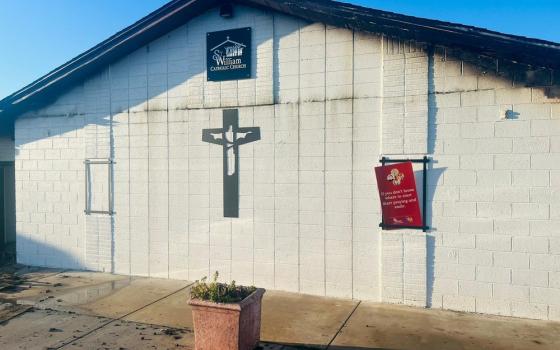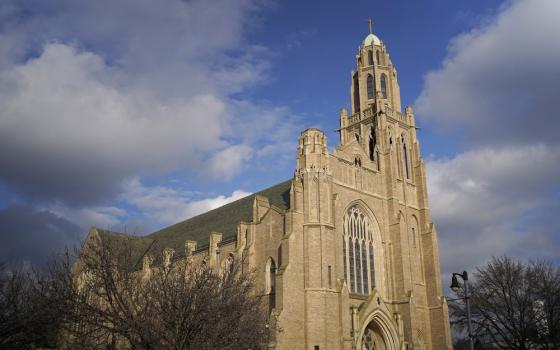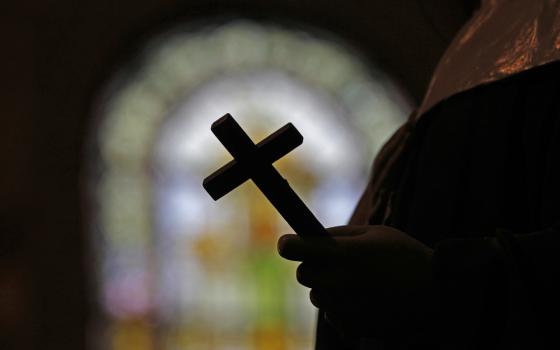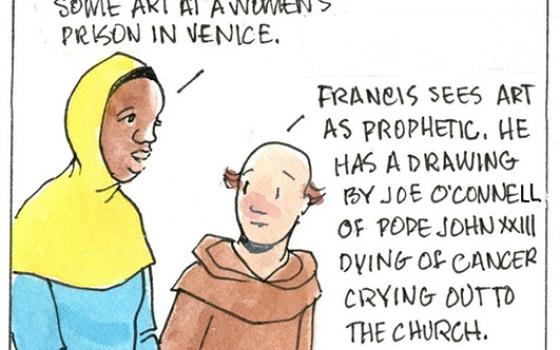The news out of Iraq is grim, and I believe it will get grimmer, despite what the Bush Administration says, as long as our troops are there. I want the troops to come home. I want the United Nations to step in, actively and nonviolently, with a considered plan to rebuild political and social trust. And I want Congress to start a massive Marshall plan to rebuild Iraq's infrastructure.
I harbor no illusions, of course, that the Bush Administration will move toward such a reversal. So as we look toward Christmas and the promise of peace on earth, my friends and I have reinvigorated our intent to agitate for a nonviolent policy in Iraq and the Middle East.
Humanity, the scholars say, was born in Iraq. Biblical myth portrays the Garden of Eden between the Tigris and Euphrates. From the Sumer Valley evolved the first system of writing. The ground bore the weight of ancient Hebrew prophets, from Abraham to Jonah. Indeed, prior to U.S. bombs, sanctions, and occupation, Iraq was a wealthy, intelligent nation, a deeply religious, spiritual, even mystical place, with a history that shaped the world.
Granted, Iraqis suffered under a brutal tyrant. Nonetheless, they had no interest in the U.S. bombing and destroying their land in the name of democracy. They are by no means fooled. They know that the real motive was the capture of Iraq's lucrative oil fields.
It occurs to me that the U.S destruction of Iraq betrays humanity's shadowy self-hatred, betrays a dark inclination toward the destruction of human civilization itself.
Advent invites us to something else altogether: "Glory to God in the highest, and on earth, peace and good will to humankind." Thus now is a good time to look through the lens of nonviolence and, despite grim news, anticipate some good news, the coming of peace on earth.
Peace, of course, is not exclusively a Christian dream. Islam in general and Iraq in particular share many saints, martyrs, heroes, and peacemakers. One of the most controversial Sufi saints in Islamic and Iraqi history was Mansur al-Hallaj (858-922).
The French scholar and peacemaker Louis Massignon spent 45 years studying Hallaj, then published a four-volume study, "The Passion of al-Hallaj." Hallaj, he said, represented not only the best of the Muslim world, but the best of humanity. He was a great witness to love and peace.
Hallaj was born in southern Persia in 858, and had memorized the Quran by the time he was 16. At 18, he left home, traveled to Baghdad, studied with a Sufi master, and then embarked on a holy pilgrimage to Mecca. When he returned, he roamed the streets of Baghdad, preached to the crowds and called them to an ecstatic love of God. He had such an affinity with people that soon word spread that he could "read hearts." He could guide anyone back to God.
In time, as these things happen, Orthodox Muslim leaders, the ones in power, looked askance at Hallaj and murmured against him. In reply, Hallaj said, that he wanted nothing more than to burn as a flame of love to God.
But the opposition wasn't mollified. On a second pilgrimage to Mecca, leaders publicly denounced him as a heretic and magician and forced him to flee. He took off for India, then China, where he spoke to thousands of people about the love of God.
He returned at length to Baghdad, where he was inundated with hundreds of letters from people all over the Far East. Now a new suspicion arose -- from the government. His popularity was deemed a threat to its power
Over the generations, Hallaj acquired the patina of a saintly hero of legendary proportions. And why not? He advocated justice for poor, worked healing miracles, and preached exuberantly of God's love for humanity. And another plus in his favor -- the powers that be denounced him relentlessly as a heretic. A pattern all too familiar.
But he was a prophet and a poet and earned himself more than one endearing name -- the ecstatic "Mystic Pillar" of Islam, "the martyr of mystical love." The names are apropos. Hallaj had announced that he wanted to give his life in divine love for humanity, to practice "a transfiguring compassion for the suffering of the world."
His mystical boldness also earned him persecution. He had insisted that "with one saint, God purifies 70,000 souls a minute." And most controversial of all, he said "I am Truth." Today, scholars believe he was simply articulating his oneness with the Creator and with creation. He was simply expressing the deep truth that every human being is united with a loving God. The powers thought otherwise. In 922, by pretext and innuendo and a miscarriage of justice, Hallaj was arrested, tortured and hanged. His head was cut off and his body burned. He faced his death serenely, forgiving his murderers and praising Allah. According to an ancient written account of his last night in prison, he spent hours repeating the words "illusion, illusion," then later "truth, truth."
In Hallaj's lifetime, Sufism was new, and orthodox leaders resolved to control it. As its most famous practitioner, Hallaj found himself opposed and his teachings undermined. And for centuries, his reputation suffered at the hands of scholars. Some doubt his existence; others accept it based on the vehement condemnations surrounding his name.
Shortly before he died, from his death-row cell he offered this prayer: "We are here, we, your witnesses. We are seeking refuge in the splendor of your glory, in order that you show us finally what you wanted to fashion and achieve, you who are God in heaven and God on earth. You bestowed on this present witness your 'I.' You wish me to be seized, imprisoned, judged, executed, hanged, my ashes to be thrown to the sand storms which will scatter them, to the waves which will play with them -- if only because the smallest particle of my ashes, a grain of aloes burned for your glory, assures to the glorious body of my transfiguration a more imposing foundation than that of immovable mountains."
The life and death of Hallaj challenge us, a millennium away, to discover the depths of mystical love in our own lives, to chart our own spiritual tradition. He invites us into that universal love, which loses itself in the ecstatic, mystical love of God, that one day, we might meet the great "Witness to Eternity" and be transfigured. Such a journey will no doubt open ourselves to the wary eye of government, but will also undermine our culture's presuppositions beneath the making of war.
Advent is a time for deepening that universal love, the love that knows no boundaries, that embraces everyone -- including Iraqis -- as sister and brother. The love that renounces war and weapons of mass destruction and pursues the vision of nonviolence. May this holy season inspire us to become mystics of universal love. May it lead us, amid our internecine world, toward making holy peace.
John Dear is a Jesuit priest, peacemaker and author, most recently of You Will Be My Witnesses, (Orbis), which features a longer version of this reflection. To invite him to speak in your church or community, contact: www.fatherjohndear.org








